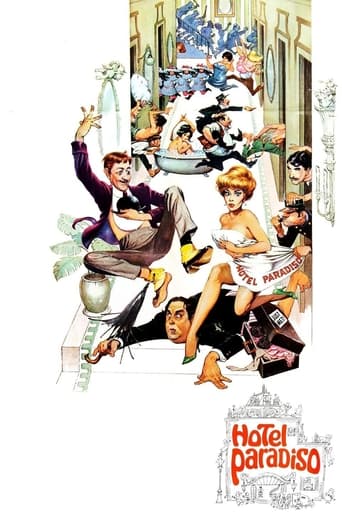theowinthrop
Farces are made in the dramas of all countries, but they are usually the most difficult things to push from one state to another. Language is the chief problem, but also there is the issue of what one country considers a farce as opposed to another. Britain's best known farce (that remains in repertoire) is Brandom Thomas's CHARLIE'S AUNT. It's main peg is the two act female impersonation act of the hero, Lord Fancourt Baberley, as the aunt of his college chum, with all the attending complications concerning two elderly suitors, his own romantic pursuit, and the arrival of the actual lady he is pretending to be. While England has sex farces (plenty of them), their best farce plays spoof the conventions. Michael Frayn's comedy NOISES OFF, about third rate actors putting on a fifth rate farce for far too long, is quite typical.But the French stuck to sexual subjects - particularly the idea of illicit sex and assignations. And the master of this was Georges Feydeau, probably their most revivable dramatist of the "Belle Epoque" (1890 - 1914). When one thinks of a farce as one where people are running from one room to another, just missing each other by seconds, it is Feydeau that most people think about. It's like his signature.However, like reading any foreign writer, that writer is best read in his or her native tongue. Feydeau is a witty writer, but his farces become mechanical marvels only in English translation. You need a top cast and director to overcome the loss of language.In 1958-59 Alec Guinness appeared in a London stage production of HOTEL PARADISO, a Feydeau farce. It was quite a success on the West End (an American production at that time also starred Bert Lahr). But the film version was not made until 1966. It is a highly amusing film, but it lacks the verve needed to make it a totally successful farce on film.The cast is good. Guinness is Benedict Boniface, who is an architect married to his wife Angelique (Peggy Mount). Ms Mount may be named Angelique, but she is no angel - she is bossy. Their neighbors are Henri and Marcelle Cot (Robert Morley and Gina Lolabrigida). He too is an architect, but is frequently consulted on building problems. He has been asked to check a hotel that may have pipe problems, or noises that could be a ghost. Lolabrigida is angry that Morley is again putting his work ahead of their marriage, but he insists he has no choice due to his court appointed duty. But Guinness intends to take advantage of his wife's temporary absence to visit an ailing relative to traipse off with Lolabrigida. In the meantime there are additional problems regarding a visiting attorney (Douglas Byng) and his four daughter, and Morley's nephew (Douglas Fowles - the assistant to Paul Eddington on YES MINISTER) and Guinness's maid (Anne Beach). All the characters end up at the rather tacky HOTEL PARADISO, which is run by Akim Tamiroff with the assistance (?) of David Battley. Others in the hotel that night are a Turk, a prominent singer and her lover a British Duke, and a writer...actually two writers - the director of the film Peter Glanville plays Feydeau, a neighbor of the Boniface and Cot families, who is watching the antics, and deciding on what his next play is going to be like. The performances are good, but they tend to be sluggish at too many points. And the translation to English from the French seems to leave out too many verbal jokes. The film as a whole is well mounted, and amusing. But it is minor Guinness, despite his having been successful in the stage production seven years earlier.
Ripshin
Yes, Fellow User, most of us are quite aware of the definition of "farce." The French are certainly known for their "farces," ahem, but they have never appealed to me - neither France, nor farce.Certainly, the film displays great production values, and fine acting, but unless you truly love the genre, the interest level grinds to a complete halt by mid-point. Why it supposedly requires great intellect to comprehend the "farce," I'll never know. Add Tootie and Blair, and you have "The Facts of Life Goes to Paris." I'll take good, solid repartee between Hepburn and Tracy any old day. Silliness simply does not suffice.
johnfadrian
While viewing an amply proportioned la Belle Epoc French "strip tease" artieste who performs over her audience's heads while on a trapeze, Mme. Cote notes that, according to the programme: "I says here 'she is the mother of three children and her husband is a professor at the Sorbonne.'"Such delightfully histerical lines are just the beginning of the fun.I first saw this during my college days when I was a projectionist at the local movie house in Rexburg, Idaho. I dispaired of ever seeing it again. When I finally found it on VHS I was in (not on) ecstasy.
Bri22
Watch this movie to see Alec Guinness at his comedic best! The plot is somewhat contrived and does have its weak spots, but the stars really shine here. Guinness is at the top of his form here - his sly, sotto voce comments to the audience, his expressive face, and his manic capering show why he should be remembered for his comedy roles as well as his more serious roles. Robert Morley plays the role he's played a hundred times: a stuffed shirt of a character who bulldozes his way through the movie (but in a good way). Gina is lovely to look at, of course, and her excitable character is sympathetic enough. The last two-thirds of the movie are almost non-stop grins as the various characters encounter and "near-miss" each other in the Hotel Paradiso.



